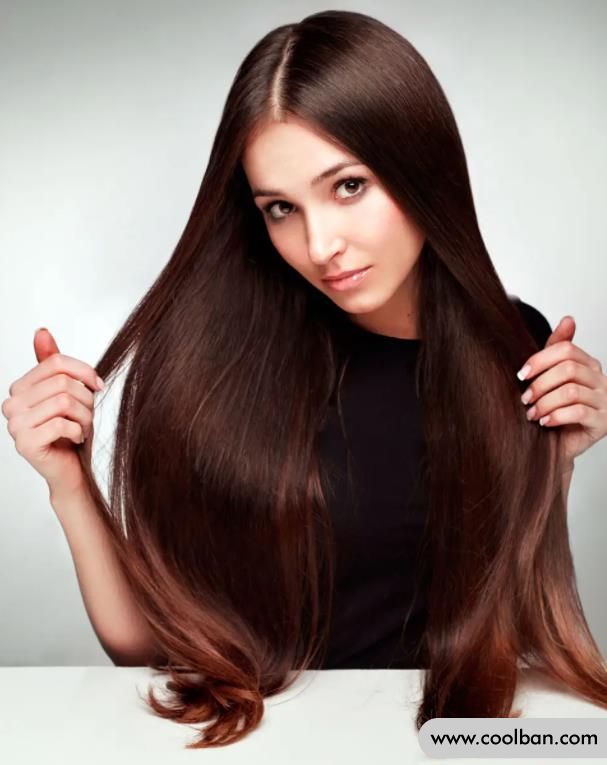Postpartum hair loss causes, solutions and how to prevent
2022-04-18
For young mothers, talking about postpartum hair loss is even more bittersweet. Despair can only be felt by experiencing it first-hand, with hair falling out in clumps, seams widening, and hairline shifting back. Although postpartum hair loss is the only way for new mothers, can they only endure the anxiety of postpartum hair loss silently?

What's the matter with postpartum hair loss
Postpartum hair loss is abnormal hair loss in women after childbirth. Hair loss occurs after about 4 months postpartum, usually due to hormone readjustment in the body, pregnancy prolongs the dormant period of hair follicles, and postpartum accelerates the period of hair loss. At this time, if the mental stress is high or the baby cries at night and does not sleep, the problem is even more serious.
Postpartum hair loss is mostly a physiological phenomenon. It occurs 4-20 weeks after giving birth, especially after 3-4 months. It can last for several months and usually recovers on its own within 6-12 months postpartum, without special treatment. Postpartum hair is greasy and prone to postpartum hair loss. As long as it is cleaned properly, do not use too stimulating shampoo. If postpartum hair loss is serious, you can take vitamin B1, oryzanol, etc. under the guidance of a doctor.
Causes of postpartum hair loss
Reason 1: Hormone changes
The rate of hair change in women is closely related to the level of estrogen in the body. When estrogen increases, hair loss slows; when estrogen decreases, postpartum hair loss increases. Sexual organ function is in the recovery period within 6 months postpartum, and estrogen secretion is significantly reduced, resulting in postpartum hair loss.
Reason 2: Psychological factors
For example, some women are emotionally unstable or stressed for various reasons before and after childbirth, leading to metabolic disorders in the body, insufficient nutrient supply, and postpartum hair loss. After a woman is pregnant, especially her first pregnancy, the psychological pressure will be very high. After giving birth, the mother will turn from excitement to fatigue, and her mood from high to low. Cortical dysfunction, autonomic dysfunction, and nerves that control hair blood vessels are also dysfunctional, leading to malnutrition leading to postpartum hair loss.
Reason 3: Dietary factors
During the postpartum lactation period, if the maternal digestion and absorption function is poor, or the diet is too monotonous and partial eclipse, or even some maternal diets in order to keep the postpartum slim body, it is easy to have nutritional deficiencies or nutritional imbalances, resulting in protein, vitamins or minerals in the body. Insufficient supply of substances and other substances, thus affecting the growth and metabolism of hair, making the hair dry and easy to break.
Reason 4: Nursing factor
Affected by traditional concepts, some mothers dare not wash or comb their hair during confinement, so that the sebum secretions and dust on the scalp are mixed and accumulated, which not only affects the blood supply of the head, but also easily leads to folliculitis or scalp infection. Increases the chance of postpartum hair loss.

What to do with postpartum hair loss
Method 1: Pay attention to the techniques of shampooing and drying your hair
Shampoo:
Choose the right shampoo for your hair. Don't rub your hair too hard, and shampoo where it naturally sags, usually adding a conditioner after washing, and a moisturizer if necessary.
Dry hair:
Wet hair is fragile and brittle, so it is recommended to pat dry with a dry towel rather than towel. The high heat of a hairdryer can damage your hair, please note that still dripping and dried hair should not dry, it is best to let your hair air dry.
Method 2: Comb your hair correctly
Use a wide-toothed wooden or horny comb, rather than a static-prone plastic comb, to work in sections in the direction your hair naturally falls.
Method 3: Try to avoid or reduce the number of hot dyeing
Perm water (cold perm) and most hair dyes have adverse effects on damaged hair and hair, and it is easy to pull the hair out when dyeing and perm, resulting in postpartum hair loss. Therefore, it is recommended not to perm dye as much as possible, or at least increase the interval time and reduce the number of hair treatments. In addition, the potions used in scalding and dyeing are more or less corrosive, which will threaten the health of mothers and lactating babies.
Method 4: Pay attention to your diet
Postpartum hair loss is mainly a process of endocrine changes. Blind tonic can lead to excessive heat in the body, which is harmful to health.
Method 5: Other considerations
Stay optimistic, get proper physical activity, and avoid exposing your hair to the sun.

How to prevent postpartum hair loss
To prevent postpartum hair loss, the most important thing is to maintain the correct daily hair care habits. And the correct daily hair care habits, including the correct shampooing method, the correct brushing method, the correct drying method.
Prevention method 1: Correct shampoo method
(1) Before shampooing, use a large-tooth comb to straighten the hair, first comb the ends of the hair, then gradually upward, and finally comb from the roots to the ends.
(2) Wash your hair with warm water and adjust the water temperature appropriately (37-38 degrees Celsius is the most suitable). Too hot is not good, it will damage the hair, too cold is not good, because the scale is difficult to remove.
(3) Pour out an appropriate amount of shampoo, massage until foaming, then apply it evenly on the head, do not pour it directly on the hair.
(4) Wash off the dirt with shampoo first, remember not to scratch the scalp with your fingertips, gently massage the scalp with your fingertips, if necessary, you can use the shampoo again.
(5) Wash thoroughly twice to make sure that no sticky substance is left at all, otherwise it will damage the hair.
Prevention method 2: Correct grooming method
Comb your hair regularly to make it smooth and neat, remove dust and dirt adhering to the hair, and promote blood circulation to the scalp. However, improper grooming can cause mechanical damage to the hair.
Prevention method 3: The correct way to comb hair is
(1) First straighten the hair with a large-toothed comb, comb the ends of the hair first, then gradually upward, and finally from the roots to the ends; then comb with a fine-toothed comb, the hair will be smoother.
(2) When combing the hair, use a little force from the root of the hair, and the comb teeth should touch the skin of the head, which is conducive to promoting blood circulation and allowing the scalp oil to reach the hair.
(3) It is also important to choose a suitable comb for hair. Combs made of natural materials, such as angle combs, wooden combs, etc., have less friction with the hair and can prevent static electricity. Brushes made with natural bristles transport oil from root to tip, moisturizing hair and adding shine.
Prevention method 4: Correct drying method
The best thing to do after shampooing is to let your hair air dry naturally. Remember to use a towel to absorb excess moisture before blow-drying. Drying dripping hair with hot air is time-consuming and damages your hair. The distance between the hair dryer and the hair should be kept 20 cm, and it is best to alternate between hot and cold air to avoid damage to the hair by the heat.
Prevention method 5: Others
To prevent postpartum hair loss, mothers should pay attention to their mental health, that is, after giving birth, they should maintain a happy mood, a happy spirit, and natural qi and blood, which can promote hair growth as soon as possible, and secondly, reasonable intake of nutrients to prevent partial eclipse. It is recommended that mothers eat more vegetables and fruits, supplement vitamins and trace elements while eating more chicken, fish and eggs.

Obese people should pay attention to strengthening exercise, eat more vegetable oil, and pay attention to losing weight. Mothers should ensure adequate sleep and avoid excessive fatigue (including premature, frequent sex, excessive brain use, excessive participation in sports, etc.).

What's the matter with postpartum hair loss
Postpartum hair loss is abnormal hair loss in women after childbirth. Hair loss occurs after about 4 months postpartum, usually due to hormone readjustment in the body, pregnancy prolongs the dormant period of hair follicles, and postpartum accelerates the period of hair loss. At this time, if the mental stress is high or the baby cries at night and does not sleep, the problem is even more serious.
Postpartum hair loss is mostly a physiological phenomenon. It occurs 4-20 weeks after giving birth, especially after 3-4 months. It can last for several months and usually recovers on its own within 6-12 months postpartum, without special treatment. Postpartum hair is greasy and prone to postpartum hair loss. As long as it is cleaned properly, do not use too stimulating shampoo. If postpartum hair loss is serious, you can take vitamin B1, oryzanol, etc. under the guidance of a doctor.
Causes of postpartum hair loss
Reason 1: Hormone changes
The rate of hair change in women is closely related to the level of estrogen in the body. When estrogen increases, hair loss slows; when estrogen decreases, postpartum hair loss increases. Sexual organ function is in the recovery period within 6 months postpartum, and estrogen secretion is significantly reduced, resulting in postpartum hair loss.
Reason 2: Psychological factors
For example, some women are emotionally unstable or stressed for various reasons before and after childbirth, leading to metabolic disorders in the body, insufficient nutrient supply, and postpartum hair loss. After a woman is pregnant, especially her first pregnancy, the psychological pressure will be very high. After giving birth, the mother will turn from excitement to fatigue, and her mood from high to low. Cortical dysfunction, autonomic dysfunction, and nerves that control hair blood vessels are also dysfunctional, leading to malnutrition leading to postpartum hair loss.
Reason 3: Dietary factors
During the postpartum lactation period, if the maternal digestion and absorption function is poor, or the diet is too monotonous and partial eclipse, or even some maternal diets in order to keep the postpartum slim body, it is easy to have nutritional deficiencies or nutritional imbalances, resulting in protein, vitamins or minerals in the body. Insufficient supply of substances and other substances, thus affecting the growth and metabolism of hair, making the hair dry and easy to break.
Reason 4: Nursing factor
Affected by traditional concepts, some mothers dare not wash or comb their hair during confinement, so that the sebum secretions and dust on the scalp are mixed and accumulated, which not only affects the blood supply of the head, but also easily leads to folliculitis or scalp infection. Increases the chance of postpartum hair loss.

What to do with postpartum hair loss
Method 1: Pay attention to the techniques of shampooing and drying your hair
Shampoo:
Choose the right shampoo for your hair. Don't rub your hair too hard, and shampoo where it naturally sags, usually adding a conditioner after washing, and a moisturizer if necessary.
Dry hair:
Wet hair is fragile and brittle, so it is recommended to pat dry with a dry towel rather than towel. The high heat of a hairdryer can damage your hair, please note that still dripping and dried hair should not dry, it is best to let your hair air dry.
Method 2: Comb your hair correctly
Use a wide-toothed wooden or horny comb, rather than a static-prone plastic comb, to work in sections in the direction your hair naturally falls.
Method 3: Try to avoid or reduce the number of hot dyeing
Perm water (cold perm) and most hair dyes have adverse effects on damaged hair and hair, and it is easy to pull the hair out when dyeing and perm, resulting in postpartum hair loss. Therefore, it is recommended not to perm dye as much as possible, or at least increase the interval time and reduce the number of hair treatments. In addition, the potions used in scalding and dyeing are more or less corrosive, which will threaten the health of mothers and lactating babies.
Method 4: Pay attention to your diet
Postpartum hair loss is mainly a process of endocrine changes. Blind tonic can lead to excessive heat in the body, which is harmful to health.
Method 5: Other considerations
Stay optimistic, get proper physical activity, and avoid exposing your hair to the sun.

How to prevent postpartum hair loss
To prevent postpartum hair loss, the most important thing is to maintain the correct daily hair care habits. And the correct daily hair care habits, including the correct shampooing method, the correct brushing method, the correct drying method.
Prevention method 1: Correct shampoo method
(1) Before shampooing, use a large-tooth comb to straighten the hair, first comb the ends of the hair, then gradually upward, and finally comb from the roots to the ends.
(2) Wash your hair with warm water and adjust the water temperature appropriately (37-38 degrees Celsius is the most suitable). Too hot is not good, it will damage the hair, too cold is not good, because the scale is difficult to remove.
(3) Pour out an appropriate amount of shampoo, massage until foaming, then apply it evenly on the head, do not pour it directly on the hair.
(4) Wash off the dirt with shampoo first, remember not to scratch the scalp with your fingertips, gently massage the scalp with your fingertips, if necessary, you can use the shampoo again.
(5) Wash thoroughly twice to make sure that no sticky substance is left at all, otherwise it will damage the hair.
Prevention method 2: Correct grooming method
Comb your hair regularly to make it smooth and neat, remove dust and dirt adhering to the hair, and promote blood circulation to the scalp. However, improper grooming can cause mechanical damage to the hair.
Prevention method 3: The correct way to comb hair is
(1) First straighten the hair with a large-toothed comb, comb the ends of the hair first, then gradually upward, and finally from the roots to the ends; then comb with a fine-toothed comb, the hair will be smoother.
(2) When combing the hair, use a little force from the root of the hair, and the comb teeth should touch the skin of the head, which is conducive to promoting blood circulation and allowing the scalp oil to reach the hair.
(3) It is also important to choose a suitable comb for hair. Combs made of natural materials, such as angle combs, wooden combs, etc., have less friction with the hair and can prevent static electricity. Brushes made with natural bristles transport oil from root to tip, moisturizing hair and adding shine.
Prevention method 4: Correct drying method
The best thing to do after shampooing is to let your hair air dry naturally. Remember to use a towel to absorb excess moisture before blow-drying. Drying dripping hair with hot air is time-consuming and damages your hair. The distance between the hair dryer and the hair should be kept 20 cm, and it is best to alternate between hot and cold air to avoid damage to the hair by the heat.
Prevention method 5: Others
To prevent postpartum hair loss, mothers should pay attention to their mental health, that is, after giving birth, they should maintain a happy mood, a happy spirit, and natural qi and blood, which can promote hair growth as soon as possible, and secondly, reasonable intake of nutrients to prevent partial eclipse. It is recommended that mothers eat more vegetables and fruits, supplement vitamins and trace elements while eating more chicken, fish and eggs.

Obese people should pay attention to strengthening exercise, eat more vegetable oil, and pay attention to losing weight. Mothers should ensure adequate sleep and avoid excessive fatigue (including premature, frequent sex, excessive brain use, excessive participation in sports, etc.).
